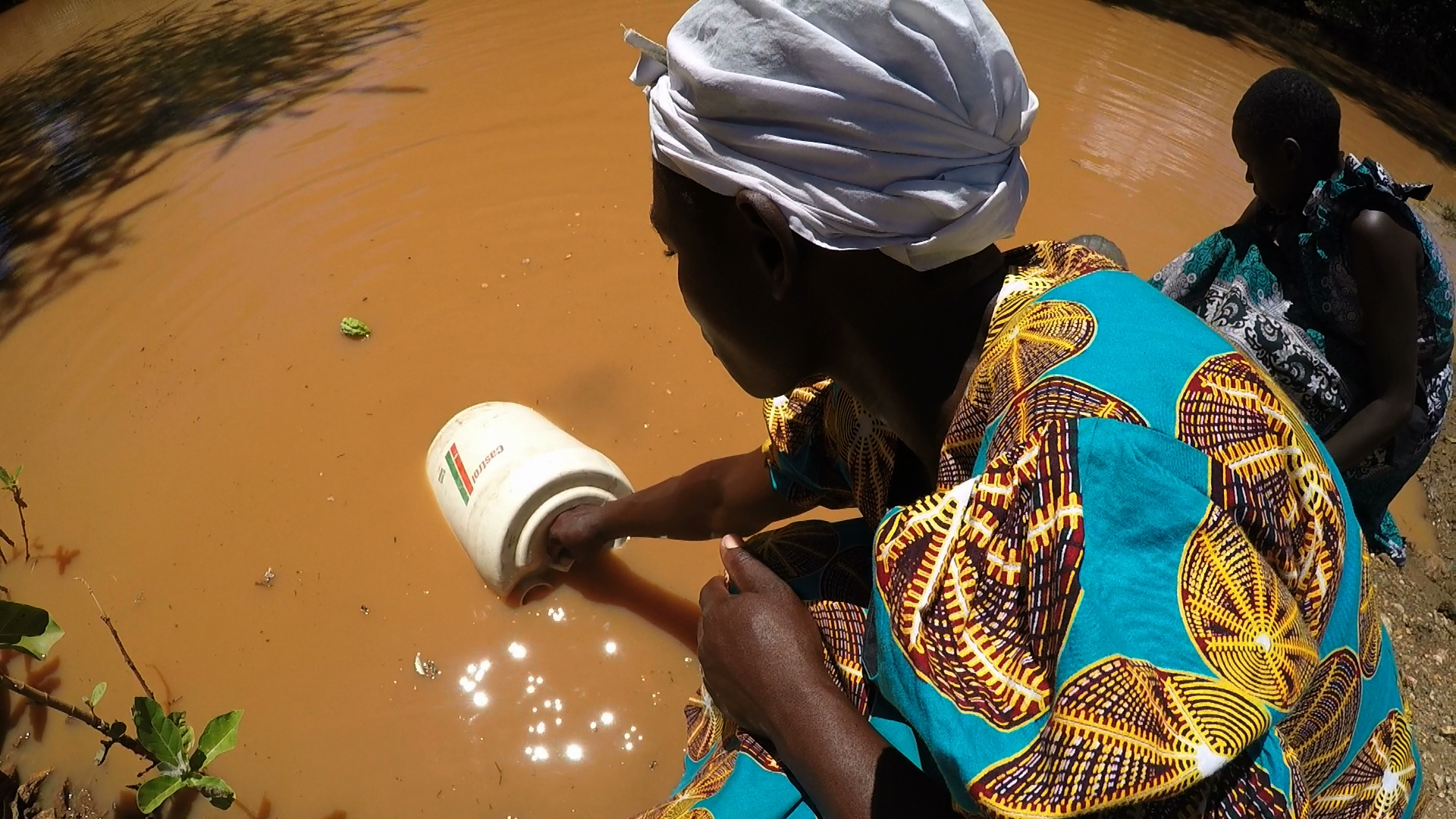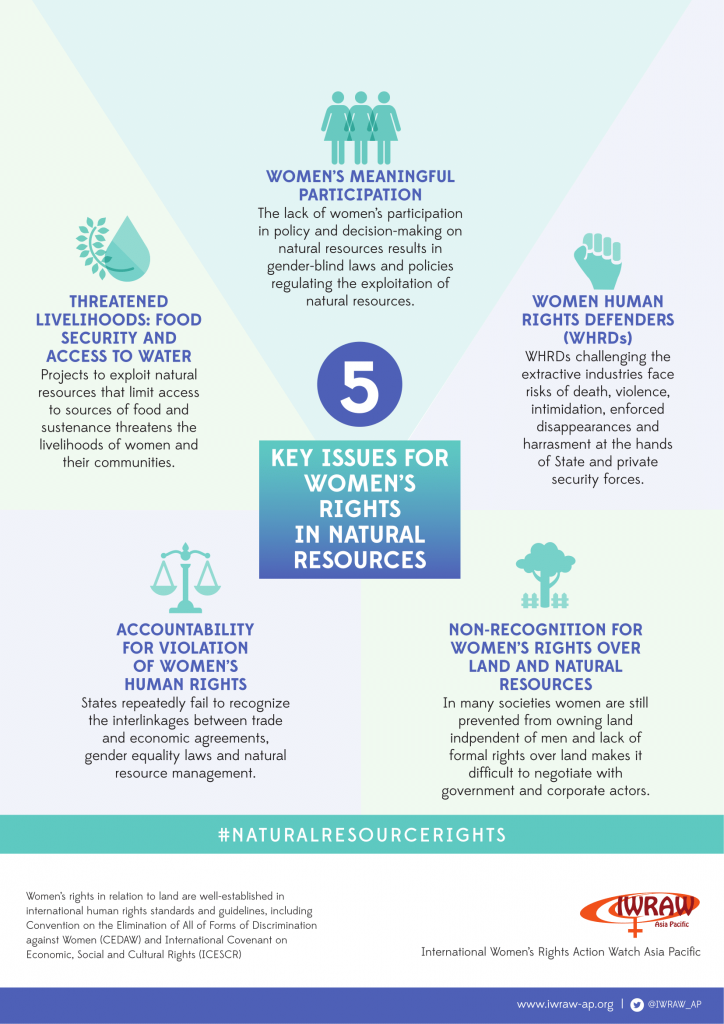
Image Credit: Robert Kibet | IDN-INPS
Natural Resources and World Water Day
Natural resources are commonly defined as “commodities that are considered valuable in their natural form” but women’s human rights defenders (WHRDs) are challenging this term, with the constant reminder that it is the commodification of these resources that has led to a lot of the negative ramifications for women.
As our Briefing Paper on Women’s Human Rights and Natural Resources highlights, “the collusion of corruption, corporate interests and unfettered State power has fostered an environment where there is little accountability for the exploitation of natural resources and its impact on women’s human rights.” Natural resources are extracted and exploited, and as such, conservation has become a real priority. The urgency has heightened with the spotlight on sustainable development and the very real threats of climate change and global warming looming over us.
Rachel Carson’s revolutionary 1960 piece, Silent Spring, made strong points in favour of conservation. As she pointed out, man’s “war against nature is inevitably a war against himself”, making a statement against the destruction of natural resources. In 2010, the United Nations General Assembly explicitly recognised the human rights to water and sanitation and acknowledged that clean drinking water and sanitation are essential for the realisation of all human rights. In 2018, it is still an issue that needs to be solved.
In this post, we will delve into one natural resource in particular: water. Today is World Water Day, and as it stands, 2.1 billion people in the world currently live without safe drinking water in their homes, which ultimately affects their health and livelihoods. It’s a distressing statistic, and even more so when one considers that women, girls and people from indigenous and rural communities are even more affected by this. Here, we will go into why the water crisis is an urgent one.
A Human Rights Perspective
We will look at natural resources from a human rights lens, and see how the UN and treaty bodies like CEDAW and ICESCR have responded to the issue. We see that international law clearly dictates that importance be placed on providing clean water to everyone, as a universal human right.
- CEDAW – CEDAW’s article 14 of General Recommendation 34 places emphasis on rural women, and how States are accountable to provide them with adequate living conditions — which includes sanitation and water supply. This is stated as being “critical for the prevention of diseases and the promotion of good health care”. GR34 also states that women have rights to natural resources.
- ICESCR – Similarly, General Comment 15 of ICESCR mentions the right to water and again outlines that States must provide clean water as “the human right to water is indispensable for leading a life in human dignity”.
- UN Water – UN Water clearly mentions that States are responsible to provide their people with clean water and sanitation services equally and without discrimination.
Beyond this, there have been many other statements made over the years prioritising the need for clean and accessible water for all. Yet there remains a major discrepancy between what is stated in these documents and the reality for many people.
Women’s Human Rights and Natural Resources
IWRAW AP’s Briefing Paper on Women’s Human Rights and Natural Resources illustrates how there are many forces that impact women’s rights to accessing natural resources. Capitalism, neoliberalism and patriarchal forces in power have all played a role in diminishing women’s access. Women are primarily given the roles of caretakers within the family, and as such have to shoulder the burden of finding alternative sources for water. So it is clear that one of the first steps to take in tackling the issue of access to water is to recognise the various manifestations of discrimination against women.

How Women and Girls Are Affected
If we dig a little deeper and analyse just how women and girls are affected by lack of clean water we will see that women have to take long trips to collect water, which poses safety issues, as they may need to navigate uneven walkways and even ravines, and face more risks of harassment and attacks. For girls, the lack of clean water affects them as it could mean missing out on school due to not having access to clean toilets or even having to walk the long distances to get water.
A case study from Zimbabwe demonstrates the impact of water shortages on women in suburban communities. The failure of the state to maintain a clean water supply system to the community forced women to travel long distances to scour for water. The lack of sufficient water for a family’s needs impacted negatively on the health and wellbeing, as well as a lack of food security and economic empowerment of the community. Women expressed frustration that during outbreaks of waterborne diseases such as typhoid or cholera, they had to shoulder also the burden of care, while at the same time being responsible for fetching water, and that this severely constrained their ability to care for their families or to grow vegetables to generate an income.
It is clear then that the impacts are multifaceted, and can keep women from reaching their full potential as active change agents within their communities. This is why many organisations emphasise the need to empower women to solve the water crisis, by way of involving them in water projects.
Business Impact on Water Resources
Companies use a lot of water and related wastage is a major pollution risk. When companies capture scarce water resources or cause environmental damage, this brings them into conflict with many communities around the world. These conflicts and their consequences are real, as reminded by the number of defenders of the environment and natural resources who are killed for their activism, including Berta Cáceres who, among other things, led the protest against the construction of the Agua Zarca hydroelectric dam in the Honduras until she was murdered in her own home.
The use of water for large-scale agribusiness conflicts with other users of water, including local farmers, many of whom are likely to be women. Availability of water is a key factor in much of the corporate land-grabbing in Africa and other parts of the world. Mining and oil production use large amounts of water, and pollute water resources, as a result of adding chemicals and as a result of waste products from the mining process itself. In South America mining operations are in frequent conflict with local communities. The largest corporate users of water are companies selling soft drinks or beer, including Coca-Cola, PepsiCo, Nestle and Unilever. Bottled water is a booming business, with Nestle controlling more than 70 percent of the world’s bottled water brands. The Nestle bottled water business is valued at around 10 billion Swiss Francs and their water extraction has brought them in conflict with local communities in areas of Pakistan and India, but also the United States and Canada.
Tackling the Water Crisis
Despite clear indications that States are obligated to protect their communities and provide them with clean and accessible water, we see that the water crisis is a worldwide problem. As such, with citizens becoming more empowered and armed with knowledge, they have begun to resist the forces that impinge their rights. A notable example of how citizens took a stand for their right to water occurred in Bolivia. Hailed as the Cochabamba Water War, it saw the people successfully taking action to resist privatisation of water supply and sewage services. A similar situation played out in Cameroon, where the communities banded together to take over and resolve water catchment conflicts. It is clear that community resilience is a common factor in resolving struggles related to water, particularly when States do not take on their responsibilities.
Women Leading Change
From here we see that it truly takes a community effort to band together and solve this water crisis. Whether it is putting pressure on States to fulfil their obligations and recognising the specific impact this has on women and girls or ensuring corporate actors don’t encroach and erode the realisation of women’s human rights in this regard, States must take on their role and fulfil their responsibilities. There is also an increasing need for States to resist the urge to privatise water services.
As pointed out by Sonke Gender Justice, the steps that can be taken also include creating awareness on how responsibilities should be shared among men and women, creating safe spaces for them to collect water and ensuring women have a space to be involved in community decision-making when it comes to water-related issues. There are clearly many things that can be done to alter this water crisis that is impacting so many of us, and there is no time like the present to get started on it.
Women have shown strong leadership both in terms of advocacy towards the protection and conservation of natural resources as well as innovation in the water sector. Moreover, women have been central to the struggle against the sale of public water to transnational corporations (TNCs), through lobbying local authorities and national ministries, forming local women’s associations, and organising marches, campaigns and direct actions. Now, with an affirmed right to water and sanitation, women and other activists have further leverage to hold governments accountable.

